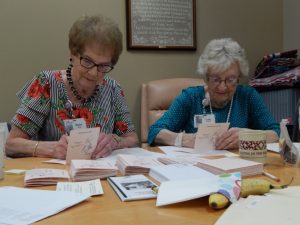
In palliative care, specialized medical care for people living with serious illnesses is provided by a team of palliative physicians, nurse practitioners, nurses, social workers, chaplains, and others. Team members work with a patient’s primary care provider or other care team members to provide an extra layer of support.
Volunteers also play a vital role in hospice care, filling the gap between loved ones and professional caregivers. Volunteers can give family caregivers a respite so they can “go out and do things and have a shoulder to cry on,” explains Patsy Anderson, of Carpio, who has worked as a hospice volunteer for almost 30 years.
Anderson became a hospice volunteer after filling a similar role for her mother, and then her mother-in-law. In the fall of 1989, when she saw Trinity Health was starting a hospice volunteer program and having classes for it, she decided to give it a try.
When she first started, volunteers administered medicine, fed patients and took them to the bathroom. “I did housework, everything,” she says. “Now it’s completely different. We don’t do as much as we used to be able to do.”
Now, personal care for hospice patients is no longer a volunteer’s duty.
“Sometimes, I have just sat and held their hand for two hours while I’m there,” Anderson says. “There was one patient who had a lot of anxiety and it calmed him down to sit there and hold his hand. You do whatever you can for them.”
She also brings food to patients if she finds out there is something they like.
Volunteers are matched with patients according to their comfort levels and are trained to meet the needs of patients and families. They visit on a schedule, but are open to change as dictated by the patient’s health and interests.
Volunteering isn’t limited to working with hospice patients and their families in a home setting. There are also volunteers, like Elaine Kress and Lolly Rostad, both of Minot, who perform duties in the Home Health & Hospice office at Town & Country Center.
About 29 years ago, Kress learned about the hospice program while her mother was in a nursing home. Curious, Kress attended a seminar to gain knowledge that would come in handy with her mother. She was unsure about volunteering until she was asked about performing office work; she jumped at the opportunity. At first, she would come in “once in a while, when they needed me, to do different things. Then, it got to be every week.”
Rostad, a retired nurse, began her volunteering career doing respite care. However, after the death of her granddaughter, she decided she “couldn’t do it anymore.”
After another volunteer who worked in the office with Kress left a vacancy, she asked Rostad, her friend, if she was interested. “And I’ve been doing it ever since,” Rostad says.
Twenty-eight years later, the two friends write and mail out bereavement cards. For three to four hours every other Tuesday, they write the cards and then pass them on to a social worker. They write a lot of letters, the number varying every time they sit down and put pen to paper. “We had enough to keep us busy.”
The cards are sent out one month, three months, six months, and one year after the passing of a hospice patient, Kress says.
Through her volunteering, Anderson says she receives “more than I give.”
“We aren’t paid, per se, with money, but the thank-you’s and getting to know all these wonderful people, it’s just so heartwarming,” she says. “I just receive so much from them.”
“I feel like I’m giving something back to the community,” Kress says. “I just feel good about this, that we can help.”
Anderson says she will continue to volunteer “until they put me out to pasture.”
If you are interested in volunteering for Trinity Health Hospice, please call 701-857-5083.
